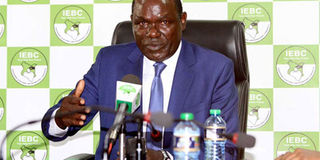Intrigues at IEBC that preceded repeat presidential poll

Independent Electoral and Boundaries Commission Chairman Wafula Chebukati addresses the Press at Anniversary Towers on October 9, 2019 concerning the visit by ODM officials. He says the repeat presidential election in 2017 was credible. PHOTO | SILA KIPLAGAT | NATION MEDIA GROUP
What you need to know:
- Mr Chebukati acknowledged that he had faced untold demands, with some family members and close friends asking him to reconsider his position.
- Mr Odinga claimed that the playing field was not level and that the incumbent was poised to enjoy undue advantage over his challengers.
As the country awaited the repeat presidential election on October 26, 2017, the man expected to smoothly deliver the watershed poll, Wafula Chebukati, was seriously toying with the idea of resigning. This threw the deep State into total panic.
Commissioner Roselyn Akombe, a member of his camp, had just tendered her resignation in what was now being seen as a clearly divided house, with vice-chairperson Connie Maina leading the other faction.
Mr Chebukati was widely expected to quit, drawing the attention of all security agencies, including the National Intelligence Service, which were concerned that the move would plunge the country into anarchy.
Time was fast running out to get an assurance from Mr Chebukati that he was not going anywhere. His silence on the subject had further fuelled the speculation.
Two months earlier, the Supreme Court, in a landmark ruling, had voided President Uhuru Kenyatta’s victory on the basis that the Independent Electoral and Boundaries Commission (IEBC) had failed to comply with the laws in presiding over the August 8 presidential election.
The President flew into a fury, promising to “revisit the Judiciary” at a later date.
UNDERSTAFFED TEAM
To resign or not was the question that weighed heavily on Mr Chebukati, a lawyer who had been plucked from private practice to lead the commission after the ouster of his predecessor, Issack Hassan.
Those close to him say he knew that he would be held personally accountable for the crisis. Upon his shoulders lay the weight of the State and cohesion of the nation.
“Unlike Akombe, I have all my family members here,” he told a confidant. “What would become of them if I left the country in a similar fashion?”
Fearing that the State could not allow her to quit at such a crucial point, Dr Akombe took advantage of the trip to inspect ballot printing in Dubai to announce her resignation and travel to the US.
Her action shocked the country, with all the attention then shifting to Mr Chebukati.
“The commission in its current state can surely not guarantee a credible election on October 26. I do not want to be party to such a mockery to electoral integrity,” she said in a statement sent from New York on October 18, 2017.
Dr Akombe had been based in New York, working with the UN, before she took up the IEBC job.
ELECTION BOYCOTT
When she quit, she revealed that Mr Chebukati was under siege.
Mr Chebukati did not respond to our request for an interview, saying on Saturday that he was in a meeting. He did not respond to our short text messages.
But in an earlier interview, he acknowledged that he had faced untold demands, with some family members and close friends asking him to reconsider his position.
There had also been claims that the IEBC chair and some commissioners had been approached and offered attractive rewards, even asylum outside the country, if they agreed to pull out of the exercise.
The National Super Alliance (Nasa) opposition coalition, whose presidential candidate Raila Odinga had decided not to participate in the repeat polls, were persuading Mr Chebukati to leave the commission to "redeem himself” rather than preside over an exercise in which half of the country was giving a wide berth.
In boycotting the election, Mr Odinga claimed that the playing field was not level and that, just like in the earlier polls, the incumbent was poised to enjoy undue advantage over his challengers.
STAYING PUT
With just days to election day, the chairman was forced to come out and reassure the nation that all was well and that he was not leaving.
“There may be differences of opinion, but the commission is united and committed to deliver a credible, free and fair election. Our mandate is on elections and we are ready in all areas. We have a contract with the Kenyan people; the chairman is not planning to resign; the commissioners are not planning to resign; that is fake news,” Mr Chebukati said.
When the communications team at Anniversary Towers sent out an invitation to newsrooms to send news crews over, the opposition figures got excited, hoping that the announcement they desperately wanted was coming up. It never did.
Before then, Nasa had organised protests to force out the commission, which it accused of bungling the August 8 presidential election in favour of President Kenyatta.
AMENDMENT BID
The IEBC boss had been receiving numerous phone calls and the kitchen was getting hotter by the day.
Not surprisingly, the State had been monitoring his phone calls, but the interest became more as the clock ticked towards October 26.
Meanwhile, the High Court stopped an attempt by Jubilee MPs to amend electoral laws to allow vice-chair Connie to become the alternate presidential returning officer, just in case the chairman quit.





